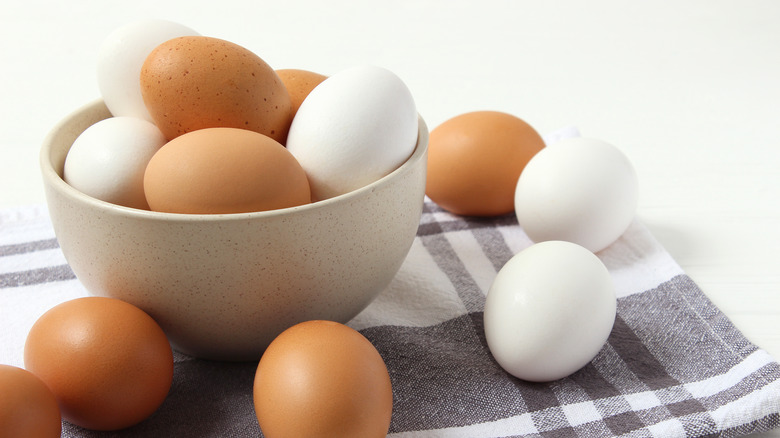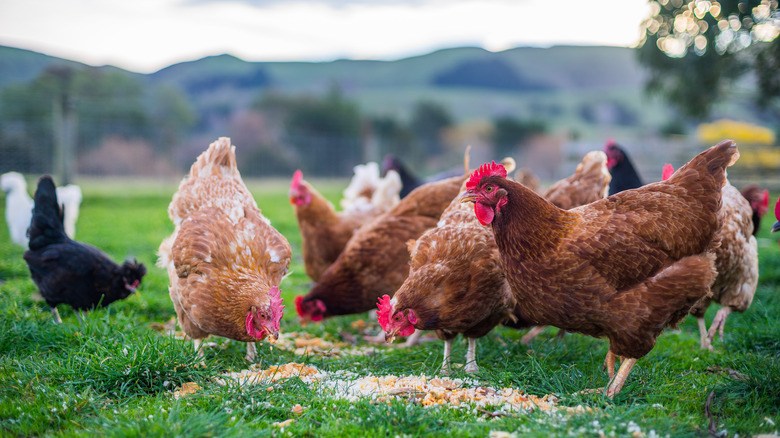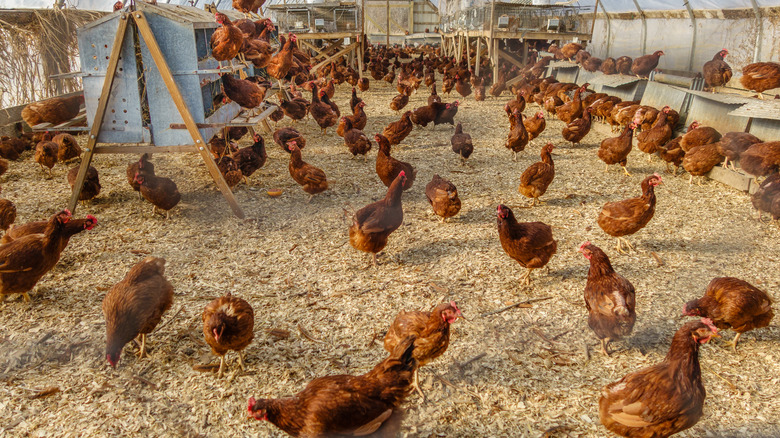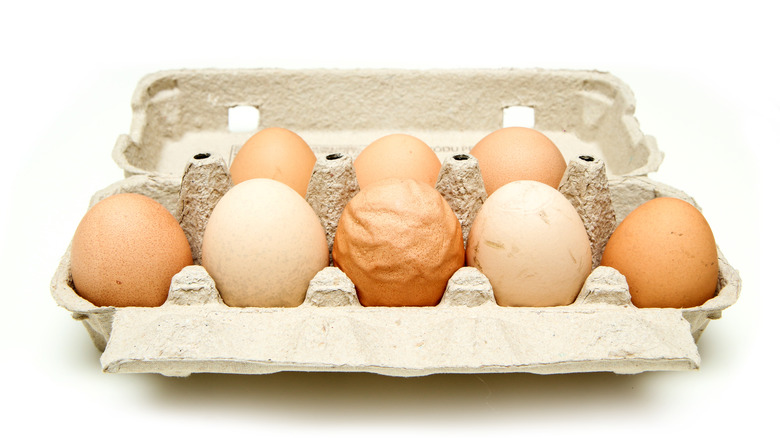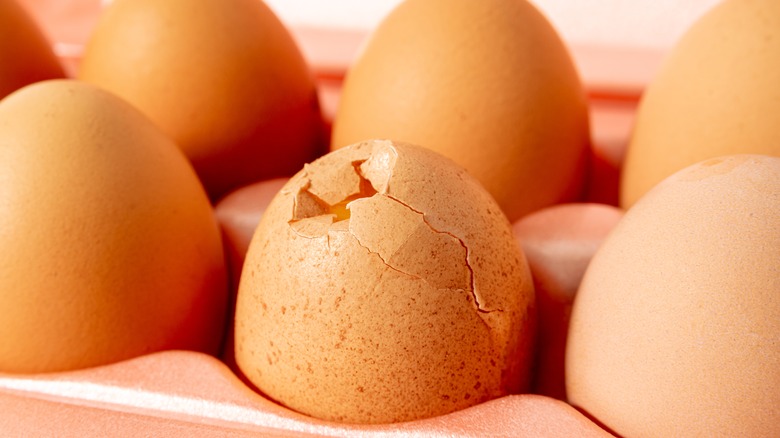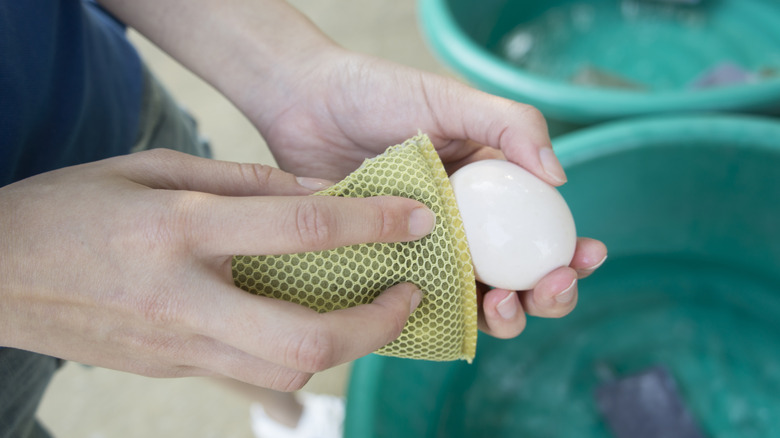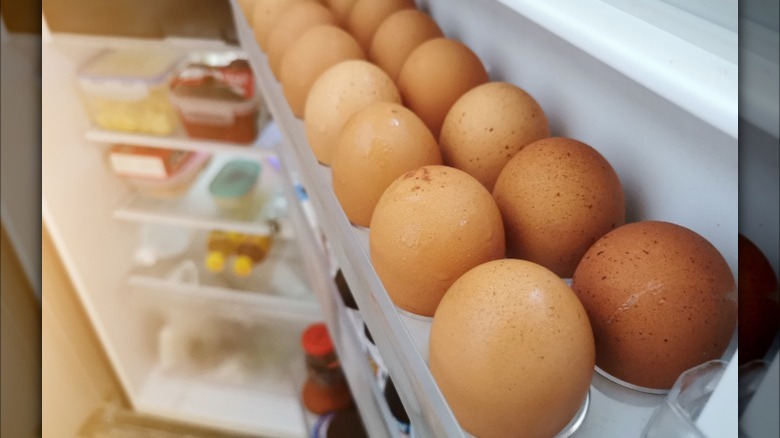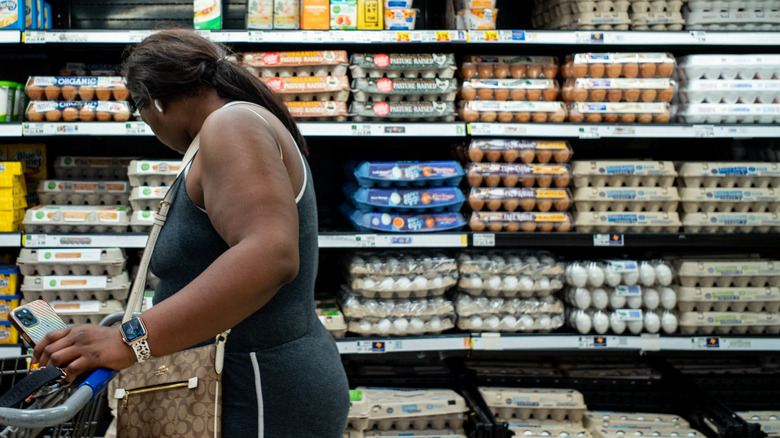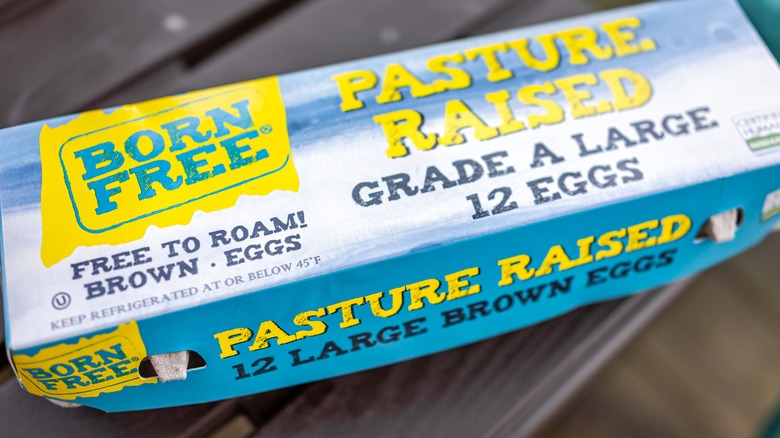10 Tips You Need When Choosing The Highest Quality Eggs
For many of us, eggs are part of our daily routine. Eggs are actually considered a superfood since they're full of vitamins A and B and are linked to a reduction in heart disease according to Healthline. With that kind of pedigree, these little spheres provide endless possibilities. Eggs can be scrambled, boiled, fried, or poached for breakfast. They can also be mashed up for a filling lunch, and sometimes eggs are part of dinner. Eggs are used to make cakes and cookies and every so often, egg whites are included in cocktails. But, have you ever thought about what kind of egg you should use?
Do you prefer white or brown? Do you like large or jumbo? What about fertile or infertile? These are all things you might never think about when choosing the perfect egg, but each consideration is just as important as how you're going to use that egg. Here are just a few tips from the experts on how to pick the best egg possible for your next dish.
Egg color isn't Important
Believe it or not, the difference between brown or white eggs has nothing to do with quality or flavor, and one isn't healthier than the other. It's actually all about the chicken. Cristo Silva of La Bahn Ranch says egg color depends on the breed of chicken. For example, Chicken Scratch explains that Rhode Island Red and New Hampshire Red chickens lay brown eggs, while the White Leghorns and Egyptian Fayoumi tend to lay white — just to name a few.
Even though the color doesn't matter when it comes to quality, there are differences between the two. Silva finds that brown eggs tend to have a thicker shell, are heartier, and the yolks are usually a darker, more orange color. That thicker shell also makes brown the egg harder to peel when hard boiled. But, both red and white chickens are fed the same things, so either egg will have the same nutrition. Silva says they also should have the same taste. But, he explains some people say that "brown tastes better."
Pay attention to what the chickens eat
What a chicken ingests will not only effect the nutrients and flavor of the bird, but according to Medical Daily, it also effects the eggs. While chicken feed is usually comprised of soy beans and corn, which is the most common choice, the food can be supplemented with vegetables and fruits, as well.
But, if the chickens are kept on a vegetarian diet, "disaster" could strike according to the Washington Post. Because chickens are omnivores, it's important that the animals eat plenty of meat, as well as grains. Now, the meat doesn't have to be a steak."They'll pretty much eat anything," says Cristo Silva of La Bahn Ranch. So, getting fowl protein is as simple as guaranteeing the birds can uncover bugs and worms while pecking for food. Those creepy crawlers will supplement the protein chickens need to be a healthier animal and, thereby, produce a healthier, higher quality egg.
Silva says chickens that are pasture raised, not only have access to meaty protein from nature, but at La Bahn, the team supplements their diet with organic grains — something not all chicken farmers do. According to Silva a lot of chicken farmers will feed the chickens "the cheapest grains they can find."
How chickens are raised affects quality
What the chicken eats goes directly to how the chickens are raised. There are three distinct ways to raise a chicken: cage-free, range-free, and pasture raised. The techniques are all very different, says Cristo Silva of La Bahn Ranch. Cage-free is exactly what it sounds like: The chickens aren't kept in cages. But, Silva says there's a "legal loophole" with the definition of cage-free eggs.
Silva says the chickens might "technically" not live in cages, but the animals are still "crammed into a small area, cooped up." So, odds are, they're getting those cheaper grains Silva was talking about. Range-free means the farms have a certain amount of square footage per chicken, says Silva. According to the Cleveland Clinic, the chickens aren't going outside and don't have the chance to walk around and hunt for grubs. The clinic explains there's no guarantee on how much time the animals spend out doors.
Chickens receive different treatment for pasture raised eggs. Silva says, "They're on a grass field. They eat bugs. They're allowed to forage." He believes how the chicken is raised makes a big difference: "I'd imagine the quality of life would improve the quality of the egg."
Age of the eggs affects quality
Cristo Silva from La Bahn Ranch says age really does matter when it comes to the quality of an egg. The sooner you use an egg, the better off you'll be. But, how can you tell how old an egg is? Check the expiration date. Most cartons, whether from the store or the farmer's market, come with a "sell by" or expiration date that tells you how fresh the eggs are, according to Healthline. The website also says that while eggs can still be eaten a few days after the expiration date, the quality will start to decline.
But, the best way to find out about the egg's freshness is to ask the farmer. Silva says that La Bahn Ranch only sells eggs that have been laid in the past one or two days. While the eggs will keep for at least a couple weeks after, there's no guarantee of the freshness or quality if you don't know how long the egg has been sitting in the carton before it was sold.
Sometimes, you might find a dimpled or wrinkled egg in your carton. These eggs are still fresh and fine to eat, according to Poultry Keeper, it just means the hen is older and so its shells are thinner, or the hen was startled while laying the eggs.
Check if the eggs are cracked
If you ever buy eggs from the farmers, you'll notice them check the eggs before they hand the carton over. They're most likely checking the eggs for cracks. While a crack can be easily seen on top when you open the carton, sometimes the cracks will be hiding on the bottom as well. Not only making it almost impossible to extract without making a big mess, cracks in an egg is also a risk.
Cristo Silva says his team isn't actually allowed to sell cracked eggs at the farmers market: "Because once they break and are leaking, that's when bacteria gets into the eggs." That bacteria that Silva speaks of is the infamous salmonella, and according to the CDC, it comes from the chickens themselves. While all chickens lay eggs with salmonella on the shells, there's no need to worry about it affecting the inside because the shell protects it. Once that shell is cracked however, the CDC says that protection is gone, and it's best to just get rid of the egg entirely.
How eggs are cleaned matters
Those pristine eggs you see at the grocery store don't come out of the hens that way. They're cleaned. It's one way the farmers ensure the eggs are salmonella-free. But, according to the Department of Primary Industries Food Authority, cleaning is a process started with a dry clean where eggs are simply brushed or cleaned with paper towel to remove any dust or small amounts of dirt. But, if the egg requires a more thorough cleaning, that's where water and chemicals come into play.
Silva says La Bahn Ranch uses only water, but other places "want to make that perfect looking egg," so chemicals are used to clean them. Chemicals usually obliterate the egg's cuticle, according to State Food Safety. But, since La Bahn uses just water, Silva says it allows the egg to maintain its natural seal, or cuticle, that the chicken leaves behind. That natural seal makes the egg last longer and ensures no bacteria will leak inside and ruin the flesh ... unless, it's cracked.
Should you refrigerate eggs or leave on the counter?
All eggs are laid with a protective seal also known as a bloom or cuticle, according to Mother Earth News. That bloom plugs the tiny pores that cover the egg's shell, thereby protecting it in two ways: no bacteria can enter the egg and no moisture can escape it. So, as long as that seal remains intact, nothing can get in or out of the egg which means nothing will ruin it and the longer the egg will last. Cristo Silva says La Bahn always tells their buyers that the eggs will last "six weeks plus" in the refrigerator or two weeks on the counter "with no refrigeration ... because of that natural seal." Up to a certain temperature "you can still keep them ... on the shelf and they won't be affected," Silva explains.
But once the temperature rises, you need to stick your eggs in the fridge. According to The Poultry Site, when the temperature rises, the eggs start to sweat, and that sweat can cause the egg's natural bloom to disintegrate. Once the bloom deteriorates, there's a higher chance of bacteria getting in.
But eggs going bad isn't the only concern. According to Healthline, how you store the eggs is absolutely necessary in preventing salmonella outbreaks: If you keep the eggs at temperatures of 40 degrees or less, you actually halt the growth of the bacteria, especially if that natural seal has been removed.
Are store-bought eggs better than farm eggs?
While it's true that you can find brown, white, large, extra-large, or jumbo eggs at both the grocery store and the farmers markets, the quality of the eggs is very different. Is hormone-free the same as all natural or organic? And what about fertile or sterile? With so many labels, how are you supposed to differentiate? According to the Modern Farmer, a lot of eggs that promote themselves as all natural, aren't. In fact, plenty of those "natural" eggs come from chickens who may be housed in cages so tiny, there isn't even enough space to turn around. Sure, the cartons might say they're cage-free, but Cristo Silva of La Bahn Ranch says that a large number of chickens might still be crammed into a small area and fed cheap food. Those cheaper living conditions translate to cheaper eggs, both in cost and quality.
On the other hand, eggs from the farmers markets usually come directly from the farms themselves, and Silva says you can see the difference when you crack open the egg, which "tends to be darker because the chickens are actually in a field actually walking around [and] spreading their wings, whereas in the store, there's no guarantee they're not in a smaller area."
Eggs are graded for quality
Another way to determine if your eggs are high quality is by the grade on the carton. According to Saunder's Eggs, all United States Department of Agriculture (USDA) eggs, whether they're from the store or farmers market, are graded. While the grade doesn't have anything to do with the color or size of the egg, it does determine if it can be sold to the public. The USDA is a voluntary service paid for by egg producers, according to the website, so if a vendor wants to sell their eggs, they need a grade.
The grades are simple: AA, A, and B. AA are the best quality you can get, according to the USDA. These are the eggs you'd use when making fried or soft-boiled eggs, while B are usually reserved for baking. Although B-level eggs can still be purchased and consumed, anything below a B is below the USDA standard, according to Saunder's Eggs, and most likely won't be sold.
Smell eggs for quality
Believe it or not smelling the eggs is another great way to tell, if your eggs are of good quality. It really is true that eggs past their prime start to give off an unpleasant odor. According to Saunder's Eggs, it doesn't matter if the egg is cooked or raw, if it's bad, it's going to smell like sulfur. Healthline says this trick is the oldest and most reliable test out there.
You can start by smelling the egg while it's still in its shell. If it doesn't emit a pungent stench, it might still be good. But if you're unsure, crack the egg open onto a plate. The smell will definitely present itself at this point, and if it does, throw it out and clean the plate before you use it again. That smell most likely means that bacteria has seeped into the egg and is now on the plate as well, making both unhealthy options.

